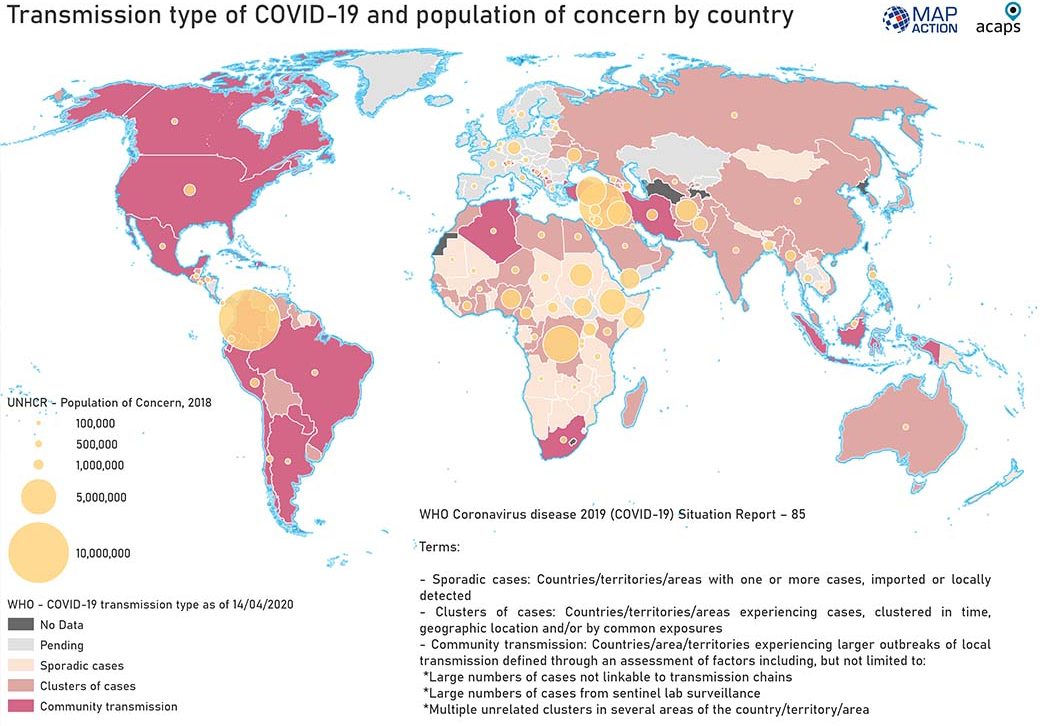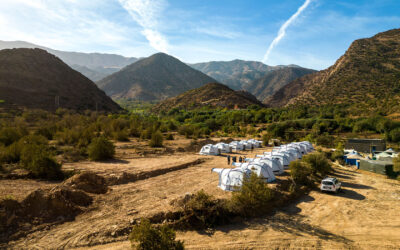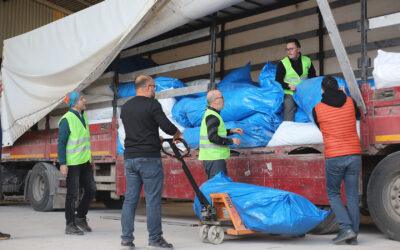Unlike most humanitarian crises, the COVID-19 pandemic could directly affect almost everyone on earth.
However, as always, it is the poorest people and communities likely to suffer the worst impacts.
The coronavirus is making it difficult and dangerous for humanitarians to operate as they were.
They are quickly refocusing priorities to address this rapidly changing crisis of unprecedented proportions, to find short- and long-term solutions for humanitarian aid.
Thanks so much. This is enormously helpful to us as our COVID work continues to grow rapidly, while other emergencies such as Cyclone Harold still need our response. We are hugely grateful to @rotarytonbridge and @RotaryGBI clubs across the UK for their very generous support. https://t.co/OllE9DzklE
— MapAction (@mapaction) April 15, 2020
Any changes to essential humanitarian programmes can have a domino effect, as the ending of one humanitarian service directly impacts another.
For example, school closures can stop child nutrition or vaccination programmes delivered through schools.
For communities already under stress from poverty and pre-existing crises, the pandemic will have very severe consequences and greatly reduce resilience to future crises.
Unlike most humanitarian crises, the COVID-19 pandemic could directly affect almost everyone on earth.”
The fall-out will be felt far into the future, regardless of future vaccines and treatments.
The countries in which humanitarian organisations operate often have weak or almost non-existent health systems.
The withdrawal or refocusing of services provided by international organisations means non-COVID-19 diseases such as tuberculosis, malaria, polio and Ebola are being side-lined.
Other disasters and emergencies are not attracting the support they need.
Cyclone Harold hit Vanuatu, Fiji and Tonga in April, floods have hit Indonesia, Iraq and Peru, while large parts of East Africa are suffering from drought and locust plagues on a level not seen for 25 years.
"It is clear that the pandemic and the climate crisis will impact poor and marginalised communities more severely because of existing inequalities."
You can help provide Pacific communities with safe water and vital hygiene kits: https://t.co/Uqbqk8ddNKhttps://t.co/IxZRd0OUpC
— Oxfam Aotearoa (@oxfamnz) May 11, 2020
At the same time, humanitarian charities and NGOs (Non-Governmental Organisations) are struggling for funding as economies around the world contract and some supporters turn their attention to the needs of their own communities.
All of which means this situation could well be truly catastrophic for the most vulnerable communities.
Many of the most vulnerable countries and communities appear not to have reached the peak levels of COVID cases seen elsewhere.
This could be because there is less international travel to such places, or perhaps that there is little testing or treatment available.
We need to act now to minimise the impact of the Coronavirus on those least able to withstand its impacts. We need your support to do this.https://t.co/R5W1SufqEt#COVID19 #COVIDー19 #COVID19Pandemic #coronavirus pic.twitter.com/H0XhhCiIVm
— MapAction (@mapaction) April 3, 2020
However once the virus takes hold, in places where hospital intensive care units and other treatment is almost non-existent, the prospects look grim.
Even before the peak arrives, the effects of the pandemic are already being felt.
Some reports show that government measures intended to protect the majority may be unintentionally harming vulnerable people – those with no savings to fall back on, as well as women, older people, refugees, migrants and people with disabilities.
As governments try to implement social distancing measures, fragile opportunities to earn a livelihood disappear for people with no state safety net to catch them.
Price spikes for essential goods, market closures and food shortages are likely.
As governments try to implement social distancing measures, fragile opportunities to earn a livelihood disappear for people with no state safety net to catch them.”
People who must already travel to access clean drinking water, toilets and healthcare services can become unable to access them altogether.
The impracticality of social distancing and isolation in densely populated refugee camps and urban slums has led to fear and protest, made worse by misinformation and rumours, especially where government guidance is unclear.
Discrimination against migrants is reported to be increasing.
They are often accused of transmitting the virus. Human rights abuses and violence are increasing in lockdown areas, particularly against marginalised people, migrants, women and children. Some refugees are attempting to return to the homes they once fled, even when there is still much danger.
The impracticality of social distancing and isolation in densely populated refugee camps and urban slums has led to fear and protest.”
Where borders are closed, bottlenecks are forming and there are concerns about people attempting to make dangerous illegal border crossings.
More difficulties are growing for the future. Lockdown measures risk affecting the planting and harvesting of crops across the world, exacerbating food insecurities and driving prices further out of the reach of the poorest.
The loss of industry, employment, education and human rights protections will cause long-term problems for many communities.
Amidst this grim picture, Rotary-supported humanitarian mapping charity MapAction is busier than it has ever been.
We are helping organisations around the world to rapidly make sense of the situation and prioritise their activities for maximum impact.


MapAction are helping organisations around the world to rapidly make sense of the situation and prioritise their activities for maximum impact.
MapAction is already providing specialist mapping and information management support to, amongst others, national governments, the Red Cross, the UN Office for Coordination of Humanitarian Affairs, Médecins Sans Frontières, the World Food Program, the World Health Organization and Unicef.
Managing a global pandemic requires the collection, management and analysis of enormous quantities of data and information.
📢Contribute to assess the impact of #COVID19
Join ACAPS Humanitarian Experts Network!
Reply to our weekly surveys by Friday and get an overview on how #Covid_19 impacts #humanitarian crises by Monday.
Learn more about this initiative, register now: https://t.co/7zvIo8Hx60 pic.twitter.com/U8lRFJ7gmz— ACAPS (@ACAPSproject) April 6, 2020
MapAction, with its experience gained on over 100 humanitarian emergencies, is uniquely qualified to provide those specialist information management skills.
With so much demand coming in, it is triaging requests from across the globe and applying its resources where they should have the biggest impact.
Projects already include: helping to build a global information platform for frontline medical teams to access information about available supplies, travel restrictions, cargo transport and flights; mapping emergency health, water and sanitation services to help aid organisations coordinate their efforts and direct their resources to areas of greatest need; and helping countries with limited public health infrastructure to prepare for the rapid onset of COVID-19.
MapAction, with its experience gained on over 100 humanitarian emergencies, is uniquely qualified to provide those specialist information management skills.”
Ian Davis, MapAction’s Fundraising & Marketing Director, said, “The great thing about the support that many Rotary clubs across the UK have provided to MapAction is that those funds have not been restricted to particular programmes of work.
“This is enabling us to be highly agile in how we respond to the current crisis, able to adapt and learn and adapt again, which is what our partners need from us.
“Much of our regular funding is tied up in projects that have been put on hold by the pandemic, and – like most charities – we are experiencing a drop in income, just when we need it the most.
“The support we get from Rotary GB&I has never been more valuable. Thank you so much for all that you’re doing.
“Please be assured, you are making a difference. We can help the large agencies to quickly see where the risks are, where the help is most needed and how to get it there. Thank you.”










